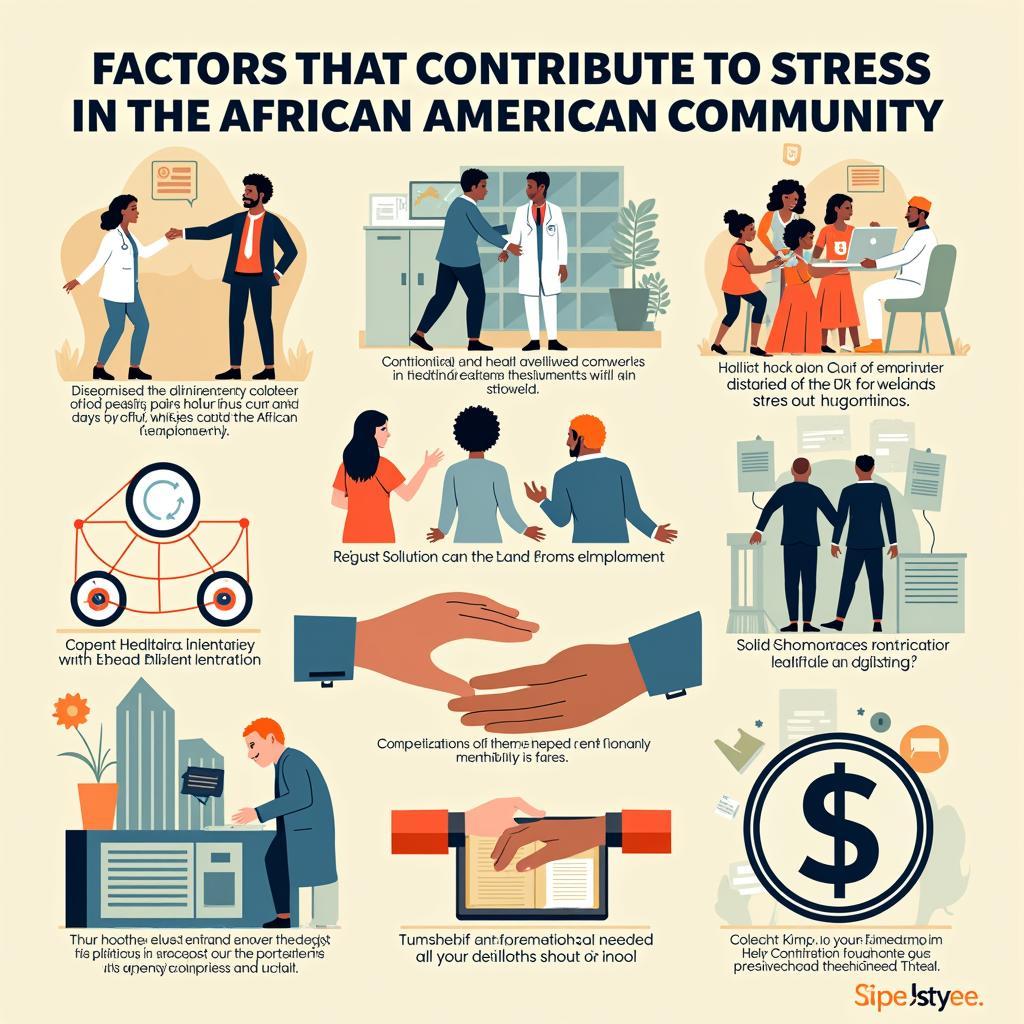Understanding and Addressing African American Stress
African American Stress is a complex issue rooted in systemic inequalities and historical trauma. This article explores the unique stressors faced by this community, delving into the historical, social, and economic factors that contribute to this pervasive issue. We’ll examine the impact of racism, discrimination, and microaggressions on mental and physical health, and discuss effective strategies for coping and building resilience.
 Factors Contributing to Stress in the African American Community
Factors Contributing to Stress in the African American Community
The Historical Roots of African American Stress
The legacy of slavery and Jim Crow laws has left deep scars on the African American psyche. Generations of oppression and systemic racism have created a climate of chronic stress, impacting everything from physical health to economic opportunity. This historical trauma manifests in various ways, including higher rates of PTSD, anxiety, and depression within the community. Understanding this historical context is crucial to addressing the present-day challenges. You might also be interested in researching some traditional african american folk medicine remedies.
Social and Economic Factors Exacerbating Stress
Beyond historical trauma, contemporary social and economic factors continue to fuel African American stress. Discrimination in housing, employment, and education creates significant barriers to upward mobility and financial security. These disparities contribute to higher rates of poverty and unemployment, further compounding the stress experienced by individuals and families.
How Racism and Microaggressions Impact Mental Health
The constant barrage of racism, both overt and subtle, takes a heavy toll on mental well-being. Microaggressions, seemingly small everyday slights and insults, accumulate over time and contribute to feelings of invalidation, anger, and frustration. These experiences can lead to increased anxiety, depression, and other mental health challenges. Dr. Anika Johnson, a renowned psychologist specializing in racial trauma, explains, “Microaggressions are not micro in their impact. They chip away at a person’s self-worth and can have devastating consequences for mental health.”
Building Resilience and Coping Mechanisms
Despite these challenges, the African American community has demonstrated remarkable resilience. Strong family and community ties, a rich cultural heritage, and a deep-rooted spiritual faith provide sources of strength and support. It’s also important to explore individual coping mechanisms and develop strategies for managing stress effectively.
What are some helpful coping strategies?
- Mindfulness and meditation: Practicing mindfulness can help individuals stay present and reduce anxiety.
- Physical activity: Exercise releases endorphins, which have mood-boosting effects.
- Seeking therapy: Talking to a therapist can provide a safe space to process emotions and develop coping skills.
- Connecting with community: Building strong social connections offers support and a sense of belonging.
Professor Kwame Asante, a leading sociologist specializing in African American studies, notes, “Resilience is not simply about bouncing back from adversity; it’s about thriving in the face of it. The African American community has a long history of resilience, drawing strength from its rich cultural heritage and strong social bonds.” Learn more about the beauty and connection found in african american quotes about nature. You may also be interested in the artistic work of african american wedding videographers.
Conclusion
African American stress is a complex and multifaceted issue with deep historical roots. Addressing this challenge requires a comprehensive approach that acknowledges the impact of systemic racism and promotes equitable access to resources and opportunities. By fostering resilience, building strong support systems, and advocating for social justice, we can work towards creating a healthier and more equitable future for all. Understanding the intricacies of african countries pronunciation can also help foster greater cultural understanding and respect. For those interested in the diverse ecosystem of Africa, you may find information on the appropriate african knife fish tank size fascinating.
FAQ
- What are the main contributors to African American stress?
- How does historical trauma impact present-day mental health?
- What are some effective coping mechanisms for stress?
- How can communities support individuals experiencing stress?
- What are the long-term effects of chronic stress?
- What resources are available for those struggling with stress?
- How can we promote mental health awareness in the African American community?
When you need help, please contact us by Phone: +255768904061, Email: [email protected] or visit our address: Mbarali DC Mawindi, Kangaga, Tanzania. Our customer service team is available 24/7.


